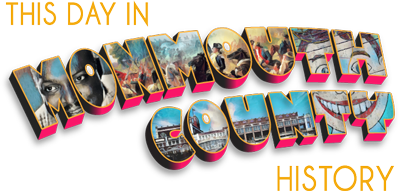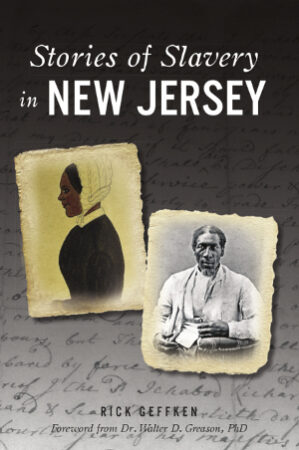Book review by John R. Barrows
Stories of Slavery in New Jersey, by Rick Geffken, ©2021 The History Press, Charleston, S.C., forward by Walter D. Greason, Ph.D. 206 pages, $21.99. Available January 4, 2021.
There are a number of good reasons why so many people in New Jersey are unaware of the sordid tale of the state’s experience with slavery.
The stories that survive from that period are gut-wrenching, poignant, sometimes awe-inspiring, other times nausea-inducing; such are the realities of man’s ultimate inhumanity toward man, and the eternal quest for human dignity and freedom.
But the fact is that when New Jersey finally got around to enacting a gradual legislative emancipation of its slaves, long after most other northern states had already done so, it began a period of white-washing of history, and those stories were largely forgotten. The experience of slaves in New Jersey was presented as relatively benign, compared with the harsh treatment of slaves in the south. New Jersey slaves were portrayed as relatively content, and, by comparison, well-treated. None of this is true.
And New Jersey certainly benefitted from a “halo effect” when it was lumped in with other northern states, specifically New England, whose leaders had effected emancipation and then began calling for an end to slavery elsewhere. New Jersey’s slave population was still growing when other northern states were ending the practice of bonded labor.
As a result, historians over the decades largely ignored New Jersey in the many books and scholarly works on the institution of slavery in U.S. history. And those that have touched upon slavery in the north have largely focused on cities and urban areas, and ignored primarily rural northern states such as New Jersey (as it was at that time).
Graham Russell Hodges’ 1997 tour de force, Slavery and Freedom in the Rural North: African Americans in Monmouth County, New Jersey, 1665-1865, began the reversal of this trend. This excellent work of scholarly analysis helped reframe the American slavery narrative to show that the experience of slaves in rural northern areas was much different from that of slaves in the cities as well as the rural south. Different, but no less cruel and inhumane.
Since then, a number of outstanding works have followed, including, among others, Parallel Communities: The Underground Railroad in South Jersey by Dennis Rizzo, (2008); The Path to Freedom: Black Families in New Jersey by Walter D. Greason (2010), The Ragged Road to Abolition: Slavery and Freedom in New Jersey, 1775-1865 by James J. Gigantino (2014); and The Princeton Fugitive Slave: The Trials of James Collins Johnson by Lolita Buckner Inniss (2019).
This year a new book joins this pantheon, Stories of Slavery in New Jersey, by Rick Geffken, a historian who is well-known in Monmouth County for his books, articles, lectures and stories about our state and regional history. Mr. Geffken’s newest book is well-titled; this is, as presented, a collection of stories about New Jersey slavery from all corners of the state.
Mr. Geffken’s Stories includes the essential contextual details about the founding of the colony of New Jersey, and how the Dutch and English each helped pave the way for an economy dependent on bonded labor. Early settlers brought in the first slaves, and colonial governors and assemblies enacted harshly restrictive laws to ensure their submission. New Jersey Blacks played important roles in the Revolutionary War, fighting for both sides, but mostly in pursuit of their own freedom. Abolitionists, led largely by Quakers, along with Blacks themselves, led the effort to bring about emancipation. The gradual emancipation of New Jersey’s slaves lasted an agonizing long period during which their treatment continued to be as inhumane as before. Free Blacks ultimately managed to build lasting families and communities despite ongoing hardships and institutional racism. These events are told through dozens and dozens of individual stories that delve into almost every aspect of the rural slave experience in the north.
No one of these books about New Jersey slavery has all of the stories extant; each of them offers something unique. But Mr. Geffken’s book is important for a number of reasons.
First, it’s timely. Our ongoing national dialogue on discrimination, policing, and institutional racism has been at a fever pitch over the past year. Historical monuments and past leaders have come under new scrutiny as people look past platitudes to learn the real history behind these icons, resulting in a robust new debate about the role of such commemorations in our society. We may be in a lull now in this regard, following the election, and while we continue to grapple with a pandemic. But we as a nation are far from done debating these serious issues.
“This country has still not come to a reckoning with one of its key foundational issues – that Black people are as equally important to its creation as the white people who owned and subjugated them, and who shamelessly took historical credit for it all,” said Geffken.
Mr. Geffken believes that this discourse can only yield the necessary positive outcomes if we first understand and come to grips with our own ugly past as a state. And so he makes it something of a mission to make sure that these stories of slavery are told, and retold, because the fact is so many people are still hearing them for the first time.
I have been in attendance at local history lectures on several occasions where I observed this. One time, Mr. Geffken was presenting a lecture on slavery in New Jersey, and from the comments and audience questions it was vividly clear that so much of the information he put forth was new to the attendees. Later, at a lecture given by an African American expert on the Underground Railroad, it emerged during the Q&A period that the lecturer was largely unaware of some of the biggest stories of slaves from our region, such as the runaway slave Titus from Colts Neck, who joined the British Army and returned to Monmouth County as “Colonel Tye,” to wreak havoc on local Patriots as the leader of a band of guerilla raiders backed by the British. Who stood up from the audience and helped inform the expert lecturer? Rick Geffken. It’s clear this subject is of great personal importance to him.
“I read Ralph Ellison’s 1952 novel Invisible Man in and around the time we were all being shocked by 1960s nightly newscasts of Black people being assaulted by the police with clubs, fire hoses, and dogs,” said the author. “I was lucky to be raised by parents who believed in and daily demonstrated the Golden Rule. Like lots of us up North I thought it was terrible what was happening in the South. I had no idea that what was visible then in Mississippi was kept invisible in New Jersey.”
This book is also important because it will reach a different audience, because of its publisher. Most of the books about the history of New Jersey slavery have been issued by traditional publishers, and therefore distributed largely through booksellers and bookstore chains, and online channels. The History Press, an imprint of Arcadia Publishing, publishers of Stories of Slavery in New Jersey, uses these channels but also distributes books about regional history through display racks in retailers throughout New Jersey, including pharmacies, souvenir shops, boardwalk retailers, etc. Tourists, new residents, people who don’t typically visit bookstores…a whole host of potential readers are more likely to encounter Mr. Geffken’s book because it will be sold in so many nontraditional places.
And Mr. Geffken confirms that in 2021 he will be presenting lectures around the state about Stories of Slavery in New Jersey, at area libraries, historical societies, and via online channels such as Zoom. His resolute devotion to spreading this knowledge is both highly commendable and inspiring.
“I was educated in New Jersey schools where nothing was ever taught about the Garden State’s deep involvement with slavery,” said Geffken. “I came late to this knowledge, half a dozen or so years ago, and decided that I could use my historical talks to let other people know what I was reading about. I didn’t start out with the idea to write a book about enslavement in New Jersey – many scholars have done wonderful studies about this fraught topic – but my largely white audiences wanted to know more. So did I. Stories of Slavery in New Jersey came from my looking deeper.”
This book is perfect for those who are interested in learning more about slavery in New Jersey, but want something more accessible rather than a lengthy academic exercise in statistical analysis, or a complex postmodern polemic. It is a must for any history student if only for its voluminous bibliography, which is the author’s choice…many books on the rack from The History Press have little in the way of notes, indices or sources, as chosen by the authors. Once again, Mr. Geffken is to be commended for creating something that opens the doors for others to follow with their own research, and help keep these stories alive.
“I’m one voice in a growing chorus of concern in this country. I hope my little book helps people interested in local history,” said Geffken. “The real work we all need to do is to affect social justice in this country. It’s the stuff that writers like Graham Hodges and Larry Greene are doing; and that activists like Bryan Stevenson, and God knows, the late John Lewis, have always done.”
Thrice-told stories these may be, but until they truly become a part of our collective consciousness, and help inform the ongoing dialog on race in our country, they need to be told yet again, and yet again. Rick Geffken isn’t going to stop. Let’s hope he never does.
John R. Barrows is editor of Monmouth Timeline Inc., a website that presents the illustrated history of Monmouth County, N.J.; the greatest stories are highlighted through “This Day in Monmouth County History” graphic features distributed via social media.


Leave a Reply